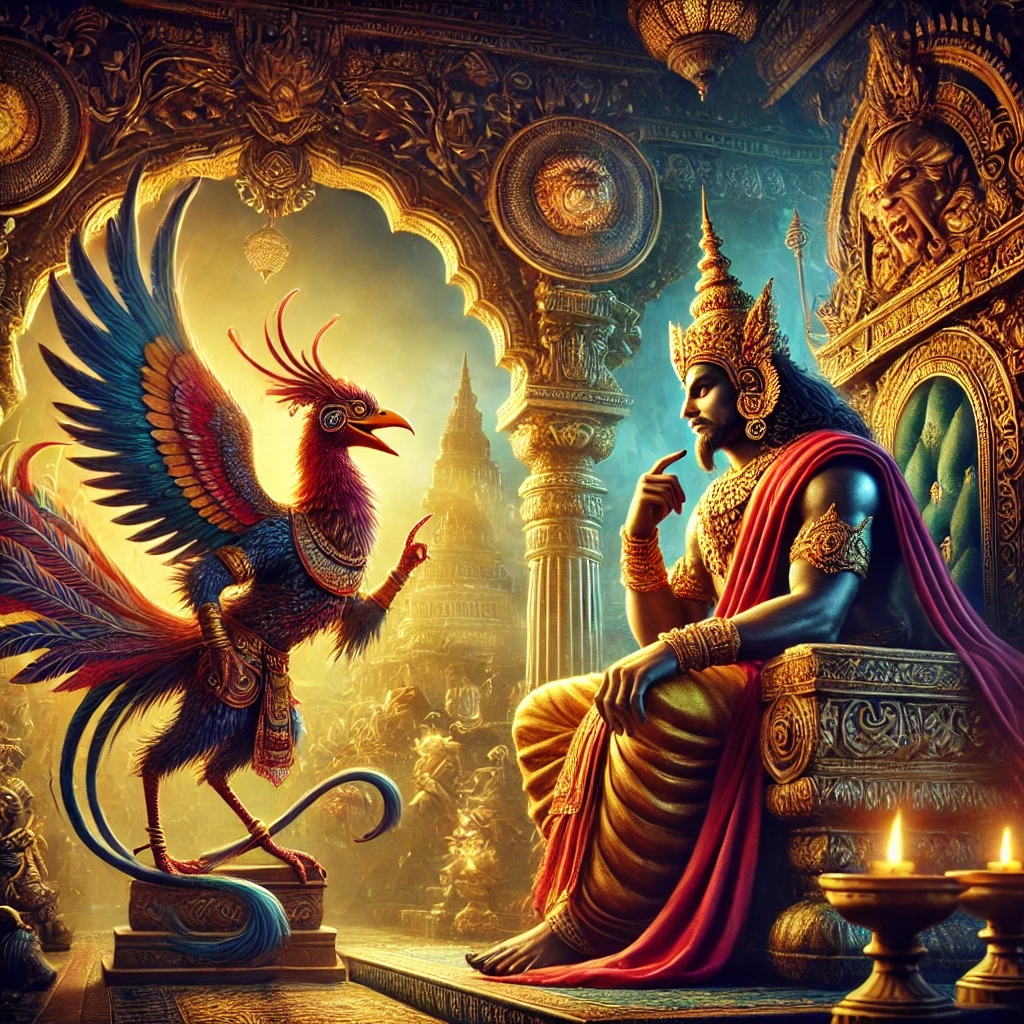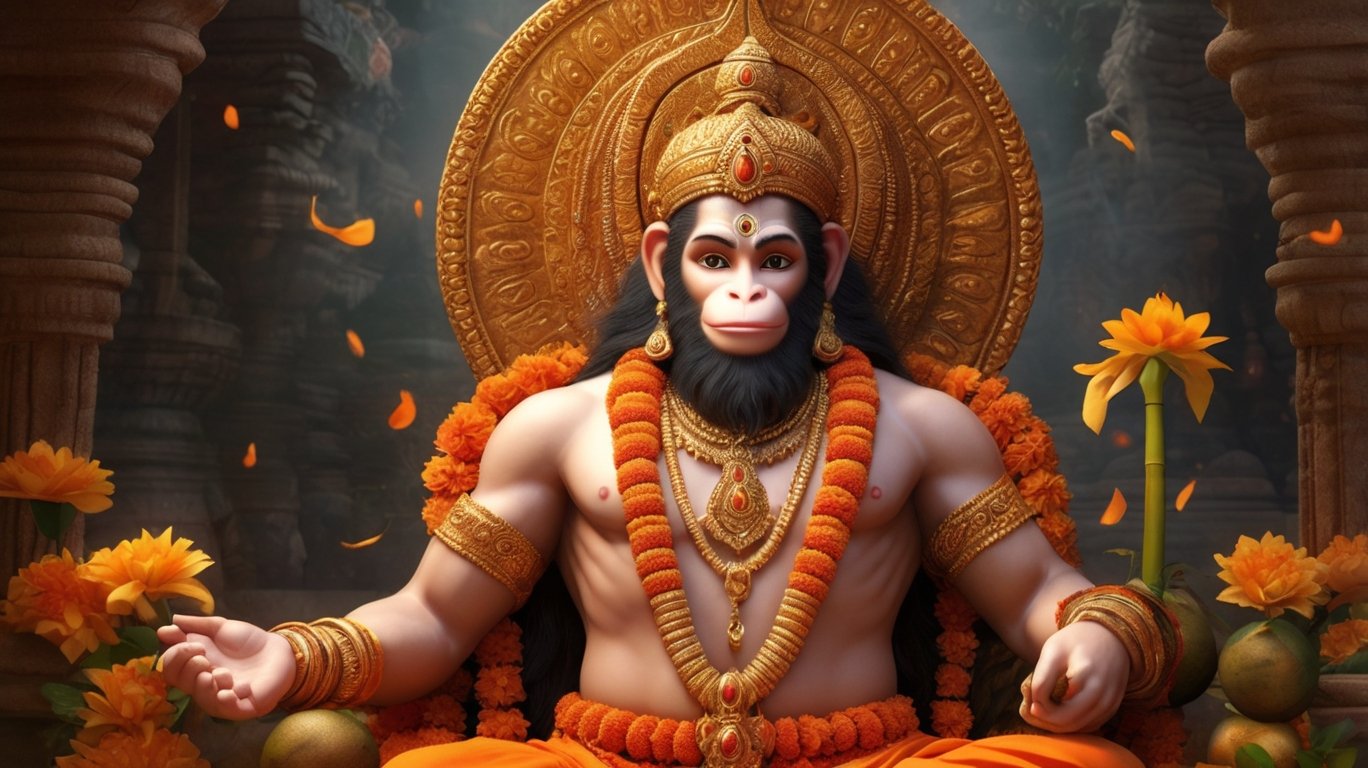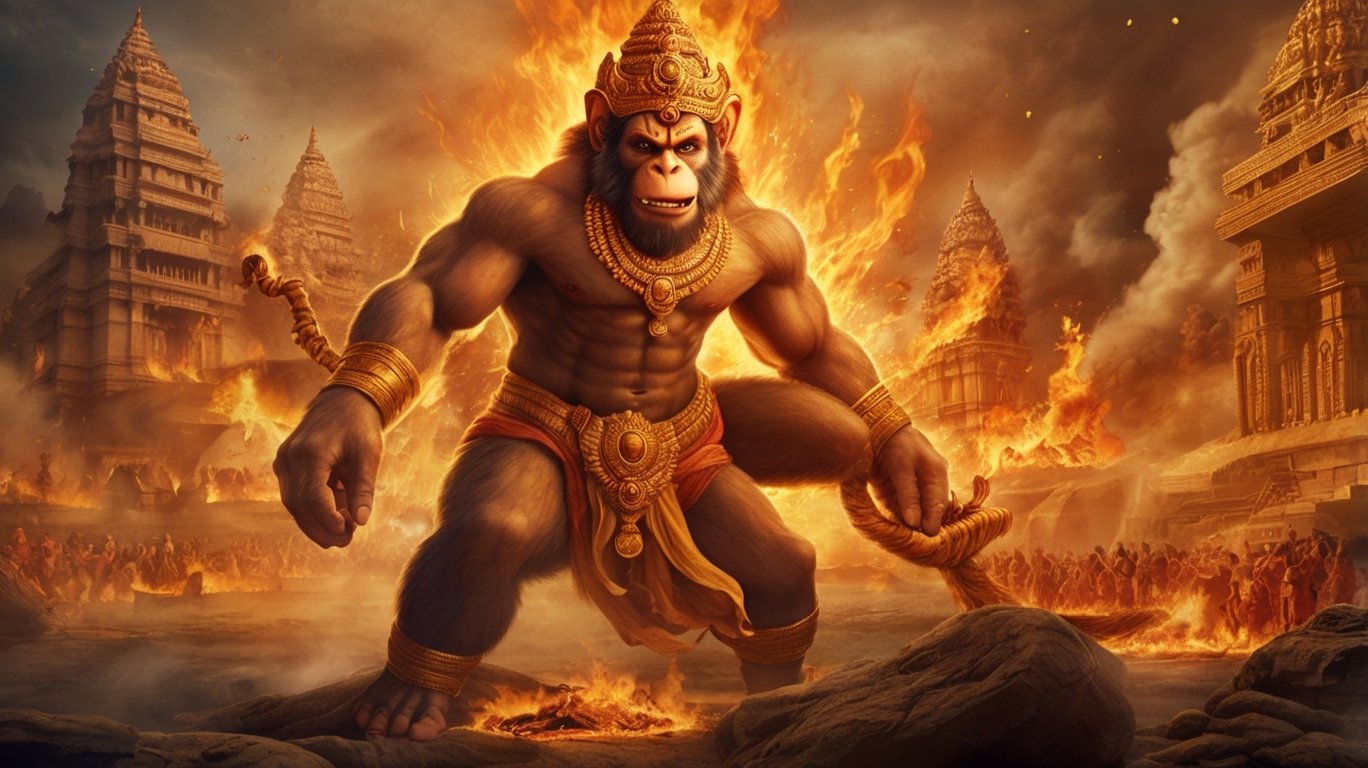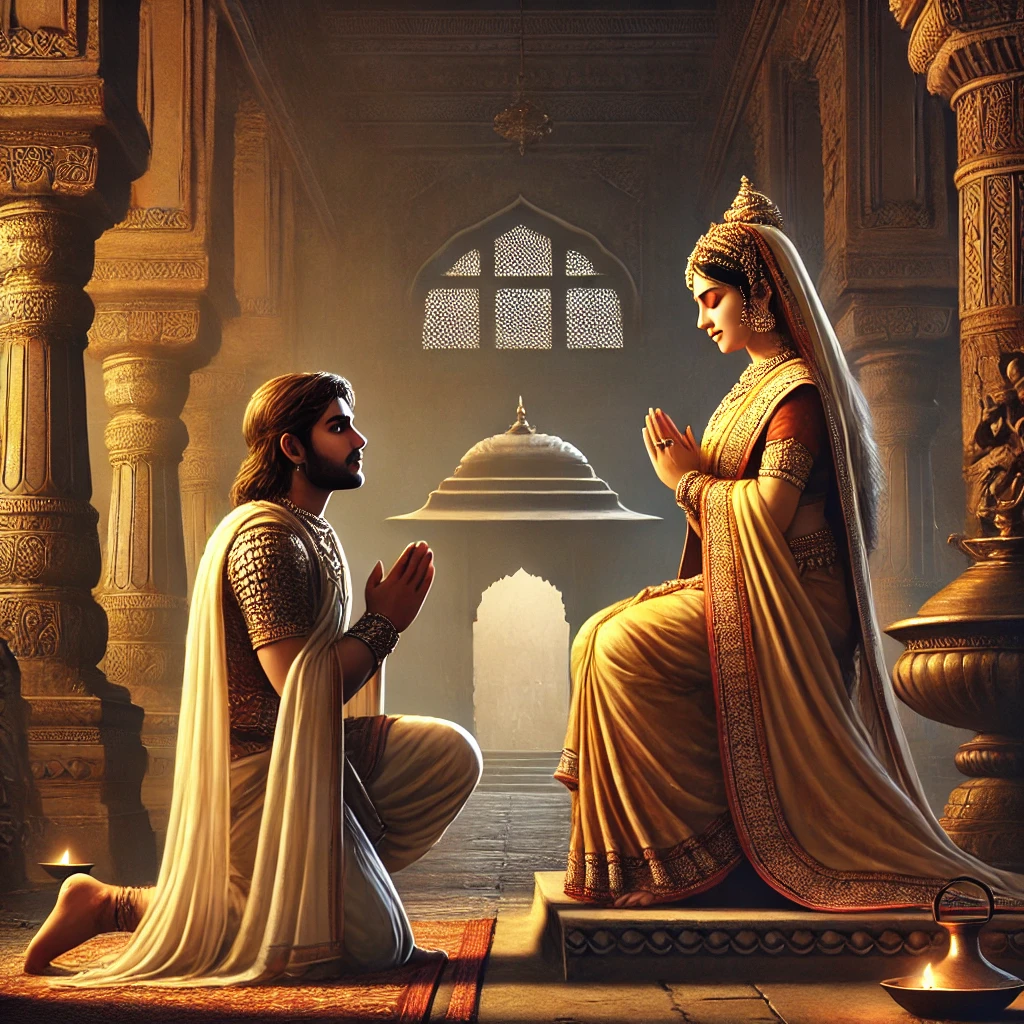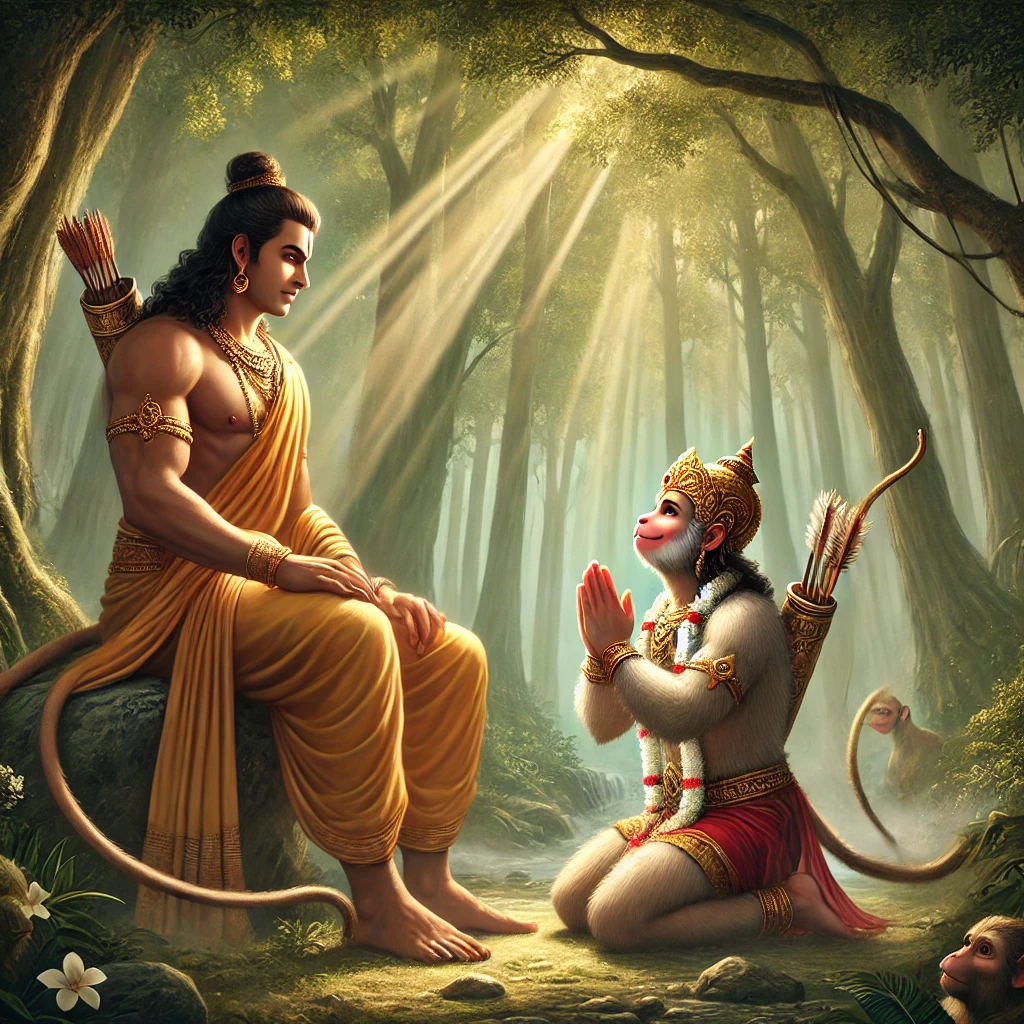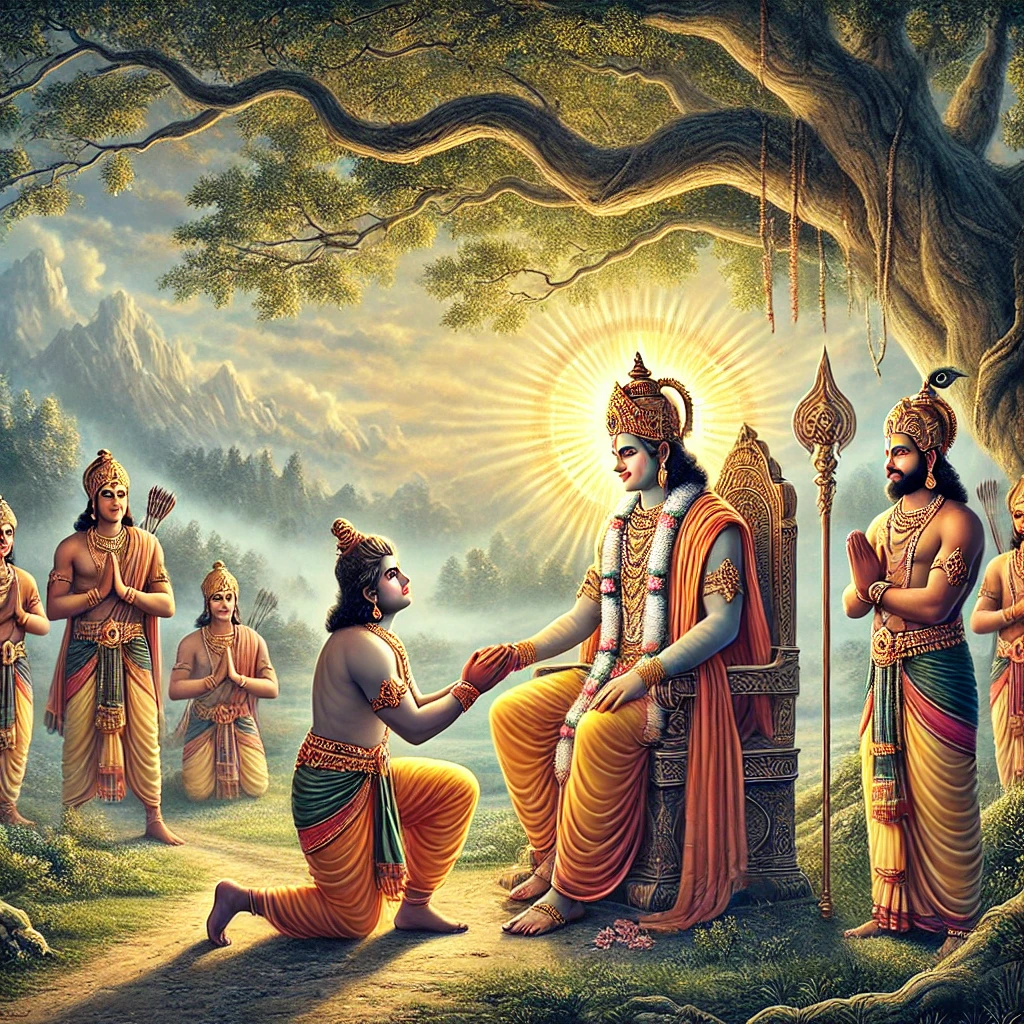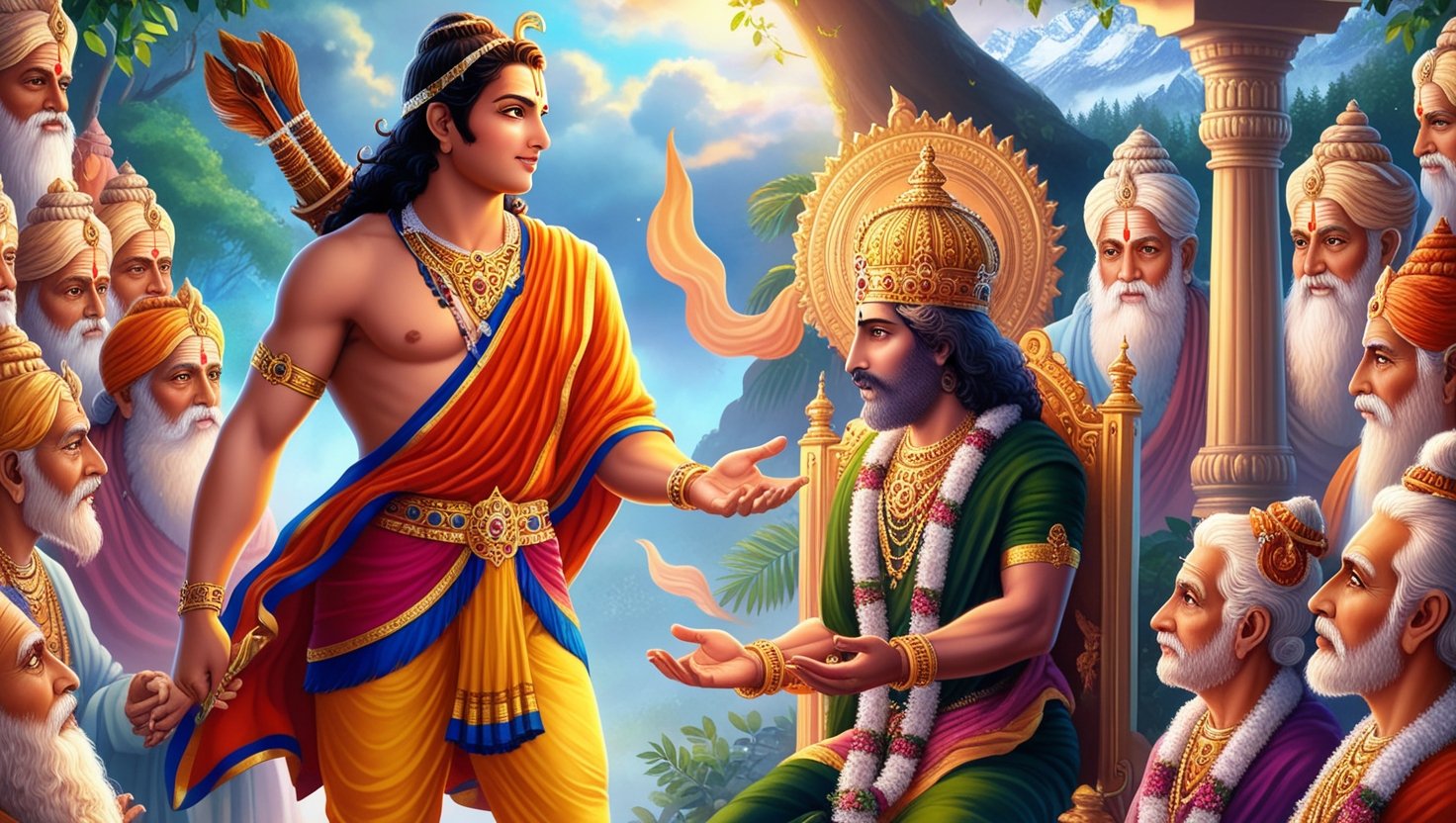Introduction
Table of Contents
Welcome to Bedesii.com, where we continue our spiritual exploration of the Sundarkand, the most dynamic section of the Ramayana. In today’s blog, we delve into a powerful narrative that reflects on the profound teachings of humility, the dangers of ego, and the boundless compassion of Lord Rama.
In this segment, we witness Ravana’s interaction with Shuka, his messenger, who urges him to reconcile with Lord Rama and release Sita. Through Shuka’s words, we see how even those close to Ravana begin to recognize the wisdom of surrendering to Rama’s divine grace rather than clinging to pride. Yet, Ravana’s arrogance blinds him, leading him further down the path of destruction. You’ll discover how these verses teach us the importance of letting go of ego and embracing humility and forgiveness, as well as the unparalleled compassion of Lord Rama, who even extends forgiveness to his fiercest enemies.
As you read on, you’ll find an insightful breakdown of each verse in a storytelling format, designed to make the lessons accessible and relevant to your spiritual journey. Join us as we uncover the timeless wisdom and life lessons that echo through the Sundarkand.

asa sajjana mama ura basa kaise, lobhi hridaya basai dhanu jaise.
tumha sarikhe santa priya more, dharau deha nahi ana nihore
Explanation
Just as wealth cannot stay with a greedy person, true virtue cannot stay in an impure heart. My heart finds comfort in the company of noble souls like you, Hanuman, who serve selflessly without any hidden motives.
Here, Lord Rama tells Hanuman that he values companionship based on genuine devotion and sincerity, not personal gain. Hanuman’s unwavering loyalty and pure devotion make him the ideal example of a true devotee, embodying the selflessness that Lord Rama cherishes.
Doha
saguna upasaka parahita nirata niti dridha nem,
te nara prana samana mama jinha ke dvija pada prema.
Explanation
Those devoted to Saguna Bhakti (worship of God with form), who are committed to doing good for others, follow moral principles and uphold their promises. Such people are as dear to me as life itself, especially those who have a deep love for the feet of Brahmins (holy teachers).”
In this verse, Lord Rama praises those who dedicate themselves to serving others, upholding virtues, and practicing devotion with reverence. He values these individuals greatly, seeing their love for righteous living as close to his heart.
Chaupai
sunu lankesa sakala guna tore, tate tumha atisaya priya more,
Rama bachana suni banara jutha, sakala kahahi jaya kripa barutha.sunata bibhishanu prabhu kai bani, nahi aghata sravanamrita jani.
pada anbuja gahi barahi bara, hridaya samata na premu apara.sunahu deva sacaracara svami, pranatapala ura antarajami.
ura kachu prathama basana rahi, prabhu pada priti sarita so bahi.aba kripala nija bhagati pavani, dehu sada Shiva mana bhavani.
evamastu kahi prabhu ranadhira, maga turata sindhu kara nira.jadapi sakha tava iccha nahi,mora darasu amogha jaga mahi.
asa kahi Rama tilaka tehi sara, sumana brishti nabha bhai apara.
Explanation
Upon meeting Vibhishana, Lord Rama speaks warmly: “O Lord of Lanka, I have heard of your many virtues. Because of them, you are especially dear to me.”
The vanara (monkey) companions of Rama also cheerfully acknowledge Vibhishana’s merit, chanting praises for him.
Hearing Lord Rama’s gracious words felt like nectar to Vibhishana, filling his heart with immense love. He repeatedly bowed at Rama’s feet, unable to contain the overflowing devotion in his heart. Vibhishana then speaks: “O Lord, ruler of all beings, protector of those who surrender to you, and knower of all hearts. The love for your feet has now removed all prior worries from my heart, flowing like a river of joy.”
He humbly requests, “O Compassionate One, please bless me with pure devotion, which even Lord Shiva and Goddess Parvati cherish.”
Lord Rama, the mighty warrior, grants his wish, replying, “So be it.” As a symbol of divine grace, Rama then marks Vibhishana’s forehead, and a shower of celestial flowers rains down from the heavens.
Doha
ravana krodha anala nija svasa samira prachanda,
jarata bibhishanu rakheu dinheu raju akhanda.jo sampati Shiva ravanahi dinhi diye dasa matha,
soi sampada bibhishanahi sakuchi dinhi raghunatha.
Explanation
In these lines, Ravana’s fiery anger represents his downfall, while Vibhishana’s unwavering faith leads him to divine protection and prosperity. Lord Rama grants Vibhishana the same wealth and kingdom that Ravana once possessed, showing that true devotion and humility attract divine blessings more than force or pride.
Chaupai
asa prabhu chadi bhajahi je ana, te nara pasu binu puchha bishana.
nija jana jani tahi apanava, prabhu subhava kapi kula mana bhava.puni sarbagya sarba ura basi, sarbarupa saba rahita udasi.
bole bachana niti pratipalaka, karana manuja danuja kula ghalaka.sunu kapisa lankapati bira, kehi bidhi taria jaladhi gambhira.
sankula makara uraga jhasha jati, ati agadha dustara saba bhati.kaha lankesa sunahu raghunayaka, koti sindhu soshaka tava sayaka.
jadyapi tadapi niti asi gai, binaya kari sagara sana jai.
Explanation:
In these verses, Lord Rama speaks on the folly of abandoning devotion to the divine for other pursuits: Those who turn away from a noble Lord like you, O Hanuman, to worship others are like animals without tails or horns—lost and directionless.
Recognizing Vibhishana as a true devotee, Lord Rama warmly accepts him, showing his gracious nature that wins the hearts of all in Hanuman’s company.
Lord Rama, who knows the hearts of all and embodies universal wisdom, then speaks as the upholder of righteousness: “I have taken human form to eliminate evil and protect virtue.”
When asked by Sugriva about crossing the vast ocean to reach Lanka, Vibhishana assures him, “Listen, O Lord of the Raghus! Though your arrows could dry up this ocean instantly, the proper approach is to first seek the ocean’s favor through humility.
Doha
prabhu tumhara kulagura jaladhi kahihi upaya bichari,
binu prayasa sagara tarihi sakala bhalu kapi dhari
Explanation
“Lord, the ocean, who is the guru (teacher) of your family, will reveal a solution upon thoughtful reflection. Without much effort, all the bears and monkeys will be able to cross it.”
In this verse, Vibhishana advises Lord Rama to approach the ocean humbly, suggesting that the ocean itself will provide a way across. His words reflect wisdom and patience, encouraging a peaceful solution to overcome the obstacle.
Chaupai
sakha kahi tumha niki upai, karia daiva jau hoi sahai.
mantra na yaha lachimana mana bhava, Rama bachana suni ati dukha pava.natha daiva kara kavana bharosa, soshia sindhu karia mana rosa.
kadara mana kahu eka adhara, daiva daiva alasi pukara.sunata bihasi bole raghubira, aisehi karaba dharahu mana dhira.
asa kahi prabhu anujahi samujhai, sindhu samipa gae raghurai.prathama pranama kinha siru nai, baithe puni tata darbha dasai.
jabahi bibhishana prabhu pahi ae, pache ravana duta pathae.
Explanation
After hearing Vibhishana’s suggestion, Hanuman agrees it’s wise to approach the ocean with humility, provided that fate is favorable. However, Lakshmana feels unsettled by this approach. With deep concern, he speaks to Rama: “My Lord, why trust in destiny? If we grow angry and dry up the ocean, we can cross it ourselves. Depending solely on fate is something only the lazy do.”
Hearing his brother’s words, Rama smiles reassuringly. He responds gently, saying, “Let us first try this approach; keep your mind calm.”
After consoling Lakshmana, Rama goes to the ocean’s shore, bows, and sits on the grass, prepared to appeal to the ocean’s grace. Just as Vibhishana arrives, Ravana’s messengers are dispatched toward Rama’s camp.
Doha
sakala charita tinha dekhe dhare kapata kapi deha,
prabhu guna hridaya sarahahi saranagata para neha.
Explanation
“Seeing all actions, the one who observes with a heart full of deceit, like a monkey disguised in a false form, fails to understand the true qualities of the Lord, who is adored by the hearts of those who seek refuge.”
In this verse, it is conveyed that people who are deceitful or disguise their true nature miss the divine qualities of the Lord, which are appreciated only by those who are genuinely devoted and surrendered.
Chaupai
pragata bakhanahi Rama subhau, ati saprema ga bisari durau.
ripu ke duta kapinha taba jane, sakala bandhi kapisa pahi ane.kaha sugriva sunahu saba banara, anga bhanga kari pathavahu nisichara.
suni sugriva bachana kapi dhae, bandhi kataka chahu pasa phirae.bahu prakara marana kapi lage, dina pukarata tadapi na tyage.
jo hamara hara nasa kana, tehi kosaladhisa kai ana.suni lachimana saba nikata bolae, daya lagi hasi turata chorae.
ravana kara dijahu yaha pati,lachimana bachana bachu kulaghati.
Explanation
Lord Rama’s true nature is evident—full of grace and love, he swiftly brings peace and harmony. Even Ravana’s messenger (the monkey) is bound by the love of Rama, whose power is unmatched.
Sugriva, the monkey king, instructs his army, “Break the enemy’s strength and make sure to send them back defeated.”
Despite fierce attacks from the enemy, the monkeys, led by Hanuman, never waver. Even when some are seriously injured, their dedication to the cause remains strong. As they fight, they chant, “If Rama, the king of Kosala, is victorious, we will win!”
Listening to Lakshmana’s words, filled with compassion, the monkeys pause. They smile, filled with joy and hope, as they prepare for what comes next.
Doha
kahehu mukhagara murha sana mama sandesu udara,
sita dei milahu na ta ava kalu tumhara.
Explanation
Ravana speaks arrogantly: ‘Why do you speak such empty words? If you do not bring Sita to me, it will be your doom!
In this verse, Ravana expresses his arrogance and threatens Hanuman with destruction, demanding that Sita be brought to him. Ravana’s pride blinds him to the truth, as he underestimates the power and devotion of Lord Rama and his followers.
Chaupai
turata nai lachimana pada matha, chale duta baranata guna gatha.
kahata Rama jasu lanka ae, ravana charana sisa tinha nae.bihasi dasanana puchi bata, kahasi na suka apani kusalata.
puni kahu khabari bibhishana keri, jahi mrityu ai ati neri.karata raja lanka satha tyagi, hoihi java kara kita abhagi.
puni kahu bhalu kisa katakai, kathina kala prerita chali aai.jinha ke jivana kara rakhavara, bhayau mridula chita sindhu bichara.
kahu tapasinha kai bata bahori, jinha ke hridaya trasa ati mori.
Explanation
Lakshmana, with great anger, walks to meet the messengers from Ravana, and with a determined heart, he speaks of Rama’s victory. He reminds them of the consequences that will befall Ravana, who will bow at the feet of Lord Rama in the end.
Ravana laughs arrogantly and asks, “What message are you bringing, foolish one? Do you believe you can defeat me?” But Hanuman replies with wisdom, warning Ravana that death is very near, and it is only his own foolishness that will bring it closer.
Ravana, abandoning his kingdom of Lanka and trusting in his own arrogance, is destined for disaster. The messengers from Ravana, as powerful as they might seem, are actually driven by fear and destined for failure. Though they boast of their might, they are unaware of the divine power Rama holds, which will crush their pride.
Doha
ki bhai bhenta ki phiri gae sravana sujasu suni mora,
kahasi na ripu dala teja bala bahuta chakita chita tora
Explanation
“Why should I seek to meet my enemy again when I have already heard the glorious name of Rama? I am no longer afraid of the mighty forces of Ravana, whose pride and strength can no longer shake my resolve.”
In this verse, Hanuman expresses his unwavering faith and confidence in Lord Rama. Hearing Rama’s name has filled him with such power and courage that no matter how strong or fearful the enemy, he remains undeterred.
Chaupai
natha kripa kari puchhehu jaise, manahu kaha krodha taji taise.
milajai jaba anuja tumhara, jatahi Rama tilaka tehi sara.ravana duta hamahi suni kana,kapinha ba dhi dinhe dukha nana.
sravana nasika katai lage, Rama sapatha dinhe hama tyage.puchhihu natha Rama katakai, badana koti sata barani na jai.
nana barana bhalu kapi dhari, bikatanana bisala bhayakari.jehi pura daheu hateu suta tora, sakala kapinha maha tehi balu thora.
amita nama bhata kathina karala, amita naga bala bipula bisala.
Explanation
Rama, in his grace, asks Hanuman to speak with a calm mind, asking him to relinquish anger and speak truthfully. Hanuman, with great devotion, says that when he meets his Lord, all will be well, as Lord Rama is the ultimate protector and savior.
The messengers of Ravana listen carefully, and Hanuman tells them that despite their formidable strength, they cannot shake his resolve. No matter how mighty their threats, his devotion to Lord Rama will never falter.
Hanuman describes the various forms and fierce powers of Ravana’s forces, including mighty warriors and terrifying beings. He reassures the messengers that no matter the strength they wield, they will ultimately be overpowered by the strength of Rama’s divine will.
Doha
dvibida mayanda nila nala angada gada bikatasi,
dadhimukha kehari nisatha satha jamavanta balarasi.
Explanation
This powerful army includes the mighty warriors Dwivida, Mainda, Neela, Nala, Angada, Gada, Vikat, Dadhimukha, Kesari, and the wise and powerful Jambavan.
In this verse, Hanuman lists the formidable warriors in Lord Rama’s army, each known for their unique strength and bravery. These warriors, filled with immense valor, are ready to fight Ravana’s forces and aid Lord Rama in his mission. They represent the diversity and unity in Rama’s army, combining physical strength with wisdom and courage.
Chaupai
e kapi saba sugriva samana, inha sama kotinha ganai ko nana.
Rama kripa atulita bala tinhahi, trina samana trailokahi ganahi.asa mai suna sravana dasakandhara, paduma atharaha juthapa bandara.
natha kataka maha so kapi nahi, jo na tumhahi jitai rana mahi.arama krodha mijahi saba hatha, ayasu pai na dehi raghunatha.
soshahi sindhu sahita jhasha byala, purahi na ta bhari kudhara bisala.mardi garda milavahi dasasisa, aisei bachana kahahi saba kisa.
garjahi tarjahi sahaja asanka, manahu grasana chahata hahi lanka.
Explanation
These vanaras (monkey warriors) are all as mighty as Sugriva, and there are countless others with similar strength. Through Lord Rama’s grace, they have unmatched power, seeing the three worlds as no more significant than a blade of grass.
Ravana, I have heard that there are eighteen thousand commanders like these monkeys in Rama’s army, each one fearless and formidable. There is not a single warrior among them who wouldn’t defeat you in battle.
If given the command by Lord Rama, these fierce vanaras would drain the ocean dry, swallowing the fish and snakes within, or they could fill it completely with mountains.
Each one would crush your pride, O ten-headed Ravana, turning your might to dust. They roar fearlessly, challenging Lanka, as if ready to devour it whole.
Doha
sahaja sura kapi bhalu saba puni sira para prabhu Rama,
ravana kala koti kahu jiti sakahi sangrama.
Explanation
All these vanaras and bears are naturally courageous and strong, and with Lord Rama as their supreme leader, they possess invincible power. Even if countless embodiments of death (kala) were to confront Ravana, they would be victorious in battle.”
This Doha emphasizes the extraordinary might of Lord Rama’s army. The vanaras and bears are not just naturally brave, but with Rama’s divine presence, their strength is unmatched. This combination of innate valor and divine blessing makes them undefeatable, even against Ravana’s vast powers.
Chaupai
rama teja bal budhi bipulai, sesha sahasa sata sakahi na gai.
sara eka soshi sata sagara, tava bhratahi pucheu naya nagara.tasu bachana suni sagara pahi, mangata pantha kripa mana mahi.
sunata bachana bihasa dasasisa, jau asi mati sahaya krita kisa.sahaja bhiru kara bachana drirhai, sagar san thani machlai.
murha mrisha ka karasi barai, ripu bala buddhi thaha mai pai.sachiva sabhita bibhishana jake, bijaya bibhuti kaha jaga take.
suni khala bacana duta risa barhi, samaya bichari patrika kadhi.ramanuja dinhi yeh paati, nath bachai judavahu chhati.
bihasi baam kar linhi ravana, sachiva boli satha laga bachavana.
Explanation
Lord Rama’s splendor, strength, and wisdom are beyond measure—even a thousand-headed Sheshnaga couldn’t fully describe them. With a single arrow, He could dry up hundreds of oceans, yet He humbly sent an envoy to request a peaceful path from the ocean.
Upon hearing Rama’s humble approach, Ravana mocked, laughing at the notion that someone with such wisdom and power would rely on the advice of mere monkeys.
Ravana’s arrogance made him dismiss the advice as cowardice, thinking his enemy’s strength and intelligence were weak compared to his own. Meanwhile, his counselors and Vibhishana looked on with apprehension, knowing the outcome of such arrogance.
When Hanuman’s messenger presented a letter from Lord Rama, Ravana laughed arrogantly, taking the letter with his left hand. He then ordered his ministers to read the message, ignoring the seriousness of the warning.
Doha
batanha manahi rijhai satha jani ghalasi kula khisa,
Rama birodha na ubarasi sarana bishnu aja isa.ki taji mana anuja iva prabhu pada pankaja bhringa,
hohi ki Rama saranala khala kula sahita patanga.
Explanation
Ravana’s pride and stubbornness are depicted as leading him toward destruction. Vibhishana is portrayed as a wise soul who sought refuge at Rama’s feet, finding salvation, while Ravana’s ego drives him to challenge the divine, which only leads to ruin. This passage emphasizes the choice between humility and arrogance, symbolizing the consequences of each path: salvation or destruction.
Chaupai
sunata sabhaya mana mukha musukai, kahata dasanana sabahi sunai.
bhumi para kara gahata akasa, laghu tapasa kara baga bilasa.kaha suka natha satya saba bani, samujhahu chari prakriti abhimani.
sunahu bahcana mama parihari krodha, natha Rama sana tajahu birodha.ati komala raghubira subhau, jadyapi akhila loka kara rau.
milata kripa tumha para prabhu karihi, ura aparadha na ekau dharihi.janakasuta raghunathahi dije, etana kaha mora prabhu kije.
jaba tehi kaha dena baidehi, charana prahara kinha satha tehi.nai charana siru chala so taha, kripa sindhu raghunayaka jaha.
kari pranamu nija katha sunai, Rama kripa apani gati pai.
Explanation
“Listening to Shuka’s words, Ravana felt a mix of hesitation and pride, yet forced a smile to mask his doubt. Ravana boasted to his court, trying to reach for the sky but grasping only the ground, mocking the wise advice of the sage with gestures of false bravado.”
Ravana’s pride is depicted as he struggles between accepting Shuka’s wisdom and clinging to his own arrogance. His gestures reveal his defiance, but also the inner conflict as he dismisses valuable guidance.
“Shuka advised, ‘My lord, what I speak is the truth. Set aside your anger and ego. Understand the four types of beings and their nature, and heed my words: end this hostility with Lord Rama, for it will only bring ruin.'”
Shuka humbly tries to remind Ravana of the wisdom of releasing his pride, explaining that different personalities exist, yet peace with Lord Rama is the only path to salvation.
“Raghunath’s nature is incredibly gentle; though he could rule the world, he remains compassionate and forgiving. If you meet him with humility, he will shower grace upon you and hold no grudges against you for past offenses.”
This verse emphasizes Rama’s forgiving nature, encouraging Ravana to seek mercy, as Rama’s divine compassion surpasses worldly power and strength.
“All I ask, my lord, is to return Sita to Raghunath. This is my sincere request. But when Shuka mentioned releasing Sita, Ravana, in a rage, struck him with a kick, showcasing his cruelty.”
Ravana’s violent reaction to the suggestion of returning Sita highlights his stubbornness and anger, refusing to acknowledge the righteous path, further sealing his fate.
“Shuka, bruised but determined, bowed at Ravana’s feet and departed, seeking the compassionate Lord Rama. Upon reaching Rama, he bowed with reverence, shared his story, and finally found peace in Rama’s grace.”
After Ravana’s rejection, Shuka turns to Lord Rama, finding refuge and fulfillment in his kindness. This act symbolizes the ultimate reward of seeking humility and aligning with righteousness.
FAQ
Who gave Shrap to Ravan?
Ravana received a curse from Nandi, the bull of Lord Shiva. Nandi cursed Ravana that he would be killed by a human, which ultimately led to his downfall at the hands of Lord Rama.
Who was Shuk in Ramayana?
Shuk was a minister and spy for Ravana in the Ramayana. He, along with another minister named Saran, was sent by Ravana to gather intelligence on Rama’s army but was captured by Vibhishana, Ravana’s brother, who had defected to Rama’s side.
Who gifted Lanka to Ravana?
Lanka was originally ruled by Vishrava, who is considered Ravana’s father. According to some texts, it was Kubera, Ravana’s half-brother, who was the original owner of Lanka. Ravana took control of Lanka after defeating Kubera, thus claiming it as his own.
रावण को श्राप किसने दिया था?
रावण को नंदी ने श्राप दिया था कि वह एक मानव द्वारा मारा जाएगा। यह श्राप अंततः राम के हाथों उसकी मृत्यु का कारण बना।
रामायण में शुक कौन था?
शुक रामायण में रावण का एक मंत्री और गुप्तचर था। उसे रावण ने राम की सेना की ताकत का पता लगाने के लिए भेजा था, लेकिन वह पकड़ा गया |
How was Shuka born?
Shuka was born from Vyasa, who underwent intense austerities. According to one narrative, Vyasa desired an heir and his semen transformed into a parrot that later became Shuka. In another version, Shuka emerged from Vyasa after a hundred years of penance.
Did Ram ever meet Luv Kush?
Yes, Lord Rama did meet his sons Luv and Kush later in the epic. After Sita’s exile, they were raised by her in the forest and eventually came into contact with Rama during a confrontation regarding their identity.
Who is the son of Vyasa?
Shuka is the son of Vyasa. He is known for narrating the Bhagavata Purana to King Parikshit during the latter’s final days.
Who told Bhagwat to Parikshit?
The sage Shuka narrated the Bhagavata Purana to King Parikshit, who was cursed to die in seven days.
Who was Ravana’s spy?
Ravana’s spy was Shuka, who was sent to gather intelligence on Rama’s forces but was ultimately captured.
Who was the vulture who saved Sita?
The vulture known for saving Sita was named Jatayu, who fought bravely against Ravana while attempting to rescue her during her abduction.
Important Links
Hanuman Chalisa in Hindi | Hanuman Chalisa in Kannada |Hanuman Chalisa in Bengali | Bajrang Baan in English | Hanuman Ashtak | Hanuman Chalisa in Assamese

